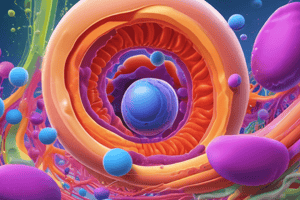Podcast
Questions and Answers
What do parietal cells secrete?
What do parietal cells secrete?
Hydrochloric acid and intrinsic factor
Where is gastric acid produced?
Where is gastric acid produced?
It is produced by the parietal cells in the fundus of the stomach
What stimulates the increased production of HCl?
What stimulates the increased production of HCl?
An increase in gastrin and histamine
How do histamine and gastrin stimulate HCl production?
How do histamine and gastrin stimulate HCl production?
What is the second messenger for gastrin and acetylcholine?
What is the second messenger for gastrin and acetylcholine?
What is the second messenger for histamine?
What is the second messenger for histamine?
How do calcium and cAMP activate the proton pump?
How do calcium and cAMP activate the proton pump?
What substances suppress parietal cell activity?
What substances suppress parietal cell activity?
How does an acute H. Pylori infection affect acid production?
How does an acute H. Pylori infection affect acid production?
How does a chronic H. Pylori infection affect HCl?
How does a chronic H. Pylori infection affect HCl?
What is Zollinger Ellison syndrome?
What is Zollinger Ellison syndrome?
What is the role of intrinsic factor?
What is the role of intrinsic factor?
Where is gastrin secreted?
Where is gastrin secreted?
Where is somatostatin secreted?
Where is somatostatin secreted?
What are the two mechanisms that gastrin enhances gastric acid secretion?
What are the two mechanisms that gastrin enhances gastric acid secretion?
What does it mean that histamine is a major 'paracrine stimulator' of acid secretion?
What does it mean that histamine is a major 'paracrine stimulator' of acid secretion?
Where is histamine localized?
Where is histamine localized?
What is the primary stimulus to histamine release?
What is the primary stimulus to histamine release?
The effects of histamine are mediated by which receptor?
The effects of histamine are mediated by which receptor?
What cells secrete pepsinogen II?
What cells secrete pepsinogen II?
What cells is mucous secreted by?
What cells is mucous secreted by?
Why is the mucous barrier important?
Why is the mucous barrier important?
Where is bicarbonate secreted in the GIT?
Where is bicarbonate secreted in the GIT?
How do prostaglandin E2 and I2 affect acid secretion?
How do prostaglandin E2 and I2 affect acid secretion?
Flashcards are hidden until you start studying
Study Notes
Acid Production and Regulation
- Parietal cells secrete hydrochloric acid (HCl) and intrinsic factor.
- Gastric acid is produced by parietal cells located in the fundus of the stomach.
- Increased production of HCl is stimulated by gastrin and histamine.
Mechanisms of HCl Production
- Histamine binds to histamine-2 receptors and gastrin binds to gastrin receptors on the basolateral surface of parietal cells.
- Binding of these ligands triggers the generation of second messengers: calcium for gastrin and acetylcholine; cAMP for histamine.
- Calcium and cAMP activate the proton pump (H+/K+ ATPase) through protein kinases, leading to H+ release.
Inhibition of Acid Production
- Prostaglandins and peptides like secretin, gastric inhibitory peptide, and somatostatin suppress parietal cell activity by inhibiting cAMP production through inhibitory G proteins.
- Acute H. pylori infections cause a short period of hypochlorhydria (reduced stomach acid).
- Chronic H. pylori infections increase basal and stimulated acid output due to heightened gastrin stimulation and decreased somatostatin.
Zollinger-Ellison Syndrome
- Characterized by gastric acid hypersecretion, severe peptic ulceration, and gastrinoma (non-beta cell islet tumor of the pancreas).
- Results in elevated gastrin levels, stimulating excess HCl production.
Intrinsic Factor and Gastrin
- Intrinsic factor is essential for vitamin B12 absorption and is secreted alongside HCl.
- G cells in the gastric antrum secrete gastrin in response to food presence or gastric releasing peptide release.
Somatostatin and its Role
- Secreted from D cells; inhibits gastrin and thus HCl production, affected by vagal stimulation.
- Gastrin enhances gastric acid secretion through trophic actions on parietal and histamine-secreting enterochromaffin-like cells.
Histamine in Acid Secretion
- Acts as a paracrine stimulator, affecting adjacent cells; localizes primarily in mucosal mast cells and enterchromaffin cells.
- Gastrin is the primary trigger for histamine release from CL cells, responsible for mediating acid secretion via the H2 receptor on parietal cells.
Pepsinogen and Mucus Production
- Pepsinogen II is secreted by mucous cells throughout the stomach and activated by gastric acid into pepsin, which functions as a proteolytic enzyme.
- Mucous, secreted by superficial epithelial and mucous cells, is vital for protecting the stomach lining from acid and pepsin injury.
Importance of Mucous Barrier
- Provides a critical barrier against H+ and safeguards the gastric mucosa from corrosive effects of luminal acid and pepsin.
Bicarbonate Secretion
- Bicarbonate is secreted by epithelial cells in the stomach and duodenum, particularly enhanced at pH levels below 3.
Prostaglandin Effects
- Prostaglandins E2 and I2 inhibit acid secretion through paracrine mechanisms, contributing to the regulation of gastric acid production.
Studying That Suits You
Use AI to generate personalized quizzes and flashcards to suit your learning preferences.




